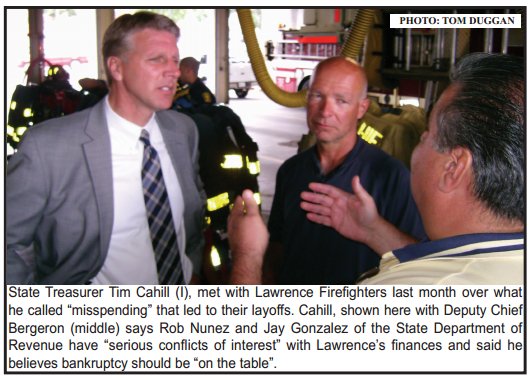Calls for Third Party Audit, and possible bankruptcy for Lawrence
By: Tom Duggan – September, 2010
Massachusetts State Treasurer and candidate for Governor Tim Cahill is calling attention to the budget mismanagement in the City of Lawrence by urging Governor Patrick to issue an independent third party audit of the city’s finances. Last March, the Governor approved legislation that allowed Lawrence officials to borrow millions from the state to address a $24 million operating deficit.
Cahill was asked on the Paying Attention! Radio program with Tom Duggan last week why he has not called for an investigation and an audit of Lawrence Mayor Lantigua’s spending of $35 Mil in loan money while laying off police and firefighters. Cahill promised during the broadcast that he was in the process of doing that.
Cahill wrote the letter (below) to Governor Patrick last month expressing his “deep concern” that the City of Lawrence still does not have its finances in order after the Governor’s office appointed a Financial Overseer nearly three months ago.
Patrick appointed Robert Nunez from the Department of Revenue to be the city’s “overseer” after Nunez and his boss Jay Gonzalez certified Lawrence’s 2007 and 2008 fiscal budgets as “balanced” but declared after Willie Lantigua’s election that each of those budgets had deficits.
Cahill said he believes that Gonzalez, the Director of Administration and Finance for Governor Patrick has a “serious conflict of interest” telling the Valley Patriot that Gonzalez was the former Bond Counsel for the City of Lawrence the last time they borrowed money and that Gonzalez has made his living with Palmer and Dodge, selling the City of Lawrence as a “a good investment” before taking a job with the Patrick administration.
“The City of Lawrence can barely keep its head above water with borrowed money and instead of looking at ways to address all city expenditures, it is cutting fire and police services. The reduction in personnel is compromising the ability of the fire department to adequately respond to emergencies, straining the budgets of neighboring communities and putting people’s lives at risk,” said Cahill.
Cahill is calling for a transparent and official review of Lawrence’s budget expenditures and believes if things continue to spiral downward, placing the city into receivership should remain a possibility.
*******************************
August 20, 2010
The Honorable Deval L. Patrick
Governor of Massachusetts
State House
Boston, MA 02133
Dear Governor Patrick,
I am writing to urge you to immediately demand an independent third party audit of the expenditures made from the proceeds of a recent $24 million operating deficit borrowing by the City of Lawrence. Recent events have indicated that the city still does not have its finances in order – even after the state provided $35 million and your office appointed a Financial Overseer. I believe a transparent and official review of the city’s budget expenditures is necessary to re-evaluate the need for a fiscal control board.
As you know, one of the key provisions of the legislation that you signed into law in March requires the Financial Overseer to report to the Secretary of A&F every 30 days regarding progress in reducing the city’s debt. Furthermore, the Overseer can have a control board put in place at any time simply by filing a letter with the Secretary of A&F. Solving budgetary problems through the use of an overseer has failed to work, and a fiscal control board should be established with strong management oversight by your office.
As you are aware, state aid to Lawrence was cut by $12 million for FY2010. Throughout the spring and summer of 2009, your administration worked with prior Lawrence leadership to close a budget deficit of $6 to $9 million on a baseline operating budget of approximately $70 million. Suddenly, this deficit was reported to be $24 million for the FY2010 budget with a projection of $10 million in further deficits for the FY2011 budget – a staggering 33 percent deficit which apparently went unnoticed by the Department of Revenue all these years. In addition, the $24 million deficit never took into account any funds that may have been received by the city after January, 2010. For example, as Chairman of the Massachusetts School Building Authority (MSBA), I know that t he MSBA made a $1 million payment in early February 2010 which should have reduced the stated deficit by at least that amount. The $24 million deficit figure never reflected the influx of the MSBA’s payment.
The absence of a long-term plan to restore Lawrence to stable financial footing is a serious issue. The situation in Lawrence pales in comparison to that in Springfield, where a combination of state and local executives comprised a control board that looked at all city expenditures and creatively developed ways for solving problems. The control board was empowered with management tools that the current financial overseer in Lawrence does not possess.
Additionally, the most troubling outcome of not having the management structure of a receiver in Lawrence has been an alarming public safety crisis that is spreading to surrounding communities, with no solution forthcoming. After nearly three months with a Financial Overseer in place, budgetary decisions have not included a full-scale restructuring of city services and have instead relied too heavily on cuts to police and fire services. The personnel reductions have compromised the ability of the city’s fire department to adequately respond to emergencies, strained neighboring communities’ budgets, and have placed overall public safety at risk.
As you once said, there is tremendous opportunity in crisis, and the same opportunity for a permanent and improved budgetary stability exists in Lawrence. However, this will not happen at the current pace and with the current strategy. Now is the time to call for an official independent third party audit of the city’s expenditures to determine what steps must be taken and to restore the public’s confidence in their city and state.
Sincerely, Timothy P. Cahill

